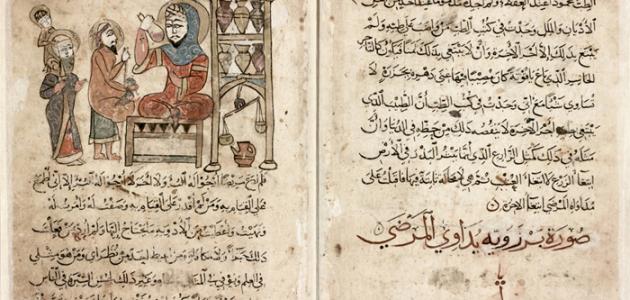Al-Jahiz
He is Abu Othman Amr bin Bahr al-Kinani al-Basri from the Kinana tribe. He was nicknamed al-Jahiz due to his bulging eyes. He is considered one of the most important and famous pillars of Abbasid literature. He represented the Mu’tazila in his time. He has countless literary works in all fields, but the most important of them are The Book of Misers, The Book of Animals, and The Book of Bayan. Al-Tabyin collected and revised various Arab, Greek, Persian and Indian cultures into famous literary volumes.
He began his life as a seller of bread and fish, then he learned the Arabic language and its etiquette from Al-Asma’i, Al-Akhfash, and other writers and Bedouins. He used his mind to prevail in everything, and he believed in the importance of experience that leads to certainty. He would sometimes attack the men of hadith who collected and narrated the hadith without seeing it. .
His style was characterized by ease and sweetness, humor, logic, and sometimes documented storytelling. He excelled in the style of digression that other writers learned from him. His end was strange in the year 255 AH, when his books, which he loved, fell on him and killed him in the city of Basra.
Misers book
The Book of Misers is one of Al-Jahiz’s most useful works. This book is characterized by the writer’s light spirit that refreshes souls. It is a humorous book with a scientific literary character. He elaborated on the description of social life in the time of the Abbasid era. He touched on the secrets of homes, their intrusions, and their private and public affairs. He elaborated on the conditions of families and their customs in an interesting, expressive, and precise manner that showed the abundance of words, his skill, and his distinction in formulating sentences from others.
Read also:The winner is left alone by Paulo CoelhoIt is different when Al-Jahiz wrote The Book of Misers. When reading the book and its contents, we read from the news and information that suggest that he wrote the book when he was old, as he was carrying the burden of the years on his shoulders, while the style followed in the sarcasm, humor, and absurdity that Al-Jahiz exuded suggests that he wrote it at a young age, which is mostly Despite its stylistic, humorous nature.
Al-Jahiz indicated in the introduction to the Book of Misers that he wrote this book to one of the great figures of the state, but he did not mention his name. However, it is most likely that it was written to Ibn al-Mudabir, who was a close friend of al-Jahiz, or to al-Fath ibn Khaqan, who was very impressed by al-Jahiz’s writings, and always encouraged him to The authorship, or to Muhammad bin Abdul Malik Al-Zayat, who had a close relationship with Al-Jahiz.
The Book of Misers represents a psychological, social, economic, and educational study of the miserly people he lived with in his surroundings in the city of Khorasan. He described them honestly in which he embodied their psychological and social reality in a humorous way. He described their stinginess, their actions, and their behavior that reflects their souls and psychological conditions, and described the calm expressions of their faces. Or anxious, and revealing their secrets, the secrets of their homes, and the conversations that take place between them without leaving a bad impression on the reader on these people.
The Book of Misers has a cultural importance that enriches the reader’s mind with a wide variety of information, such as the names of famous people, the names of countries and their characteristics, and the character and behavior of its inhabitants. It includes many hadiths and poems, and also contains historical and geographical information.
Read also:Kalila and Dimna by Ibn al-MuqaffaA selected story from the book The Misers
- Marwa's miserly child: When Ahmed bin Rashid heard the story of the miserly rooster of Marv from Thumama, he said: I was with an old man from the people of Marv, and his little boy was playing in his hands, so I said to him: Either he was frivolous or he was testing: Feed me with your bread. He said: You don’t want it, it is bitter, so I said: So drink to me. Of your water, he said: You don't want it to be salty. I said: Give me such-and-such. He said: You do not want it to be such-and-such, until I prepared many kinds of things, all of which prevent him and make him hate me. Then his father laughed and said: What is our religion? This is his knowledge of what you hear? It means: stinginess is inherent in them, their races, and their character.
- The miser with incenseStingy said: It would be nice in the winter, for it preserves the smell of incense, and wine does not acidify if left open, and broth does not spoil in it if it stays for days, and he only evaporates in the homes of his friends, so when it is summer he calls for his clothes and wears them over his shirt so that nothing of the incense is lost.
- The miserly rooster of MarwaThumama said: I have never seen a rooster in a town that was not a liar, taking the grain with its beak and then spewing it out in front of the hen, except for the roosters of Marrow, for I have seen roosters of Marrow robbing chickens of the love in their beaks. He said: I knew that their miserliness is something in the nature of the country, and in the essence of the water, and then it has spread to all their animals.
Other works by Al-Jahiz
- Animal bookOne of Al-Jahiz’s most important recent works, The Book of Animals, is considered the first Arabic scientific book concerned with zoology, and talks about the conditions of animals, their natures, and their instincts from a scientific perspective using a distinctive linguistic style. In The Animal Book, Al-Jahiz also touched on philosophy and natural sciences, and touched on the politics of individuals, nations, and conflict between religious sects. He also spoke in The Animal Book about geographical, medical, jurisprudential, poetic, and humorous information.
- The book of statement and manifestationIt is considered one of Al-Jahiz’s largest works. It was written in his last days. The aim of its writing was to defend the Arabic language, demonstrate its eloquence, the magnificence of its words, and the appropriateness of its meanings. In this book, Al-Jahiz dealt with some literary topics in a philosophical manner, and mentioned some historical commandments and letters, the most important preachers and some sermons, in addition to poetry, anecdotes, and evidence from the Holy Qur’an and Sunnah that support his goals.









